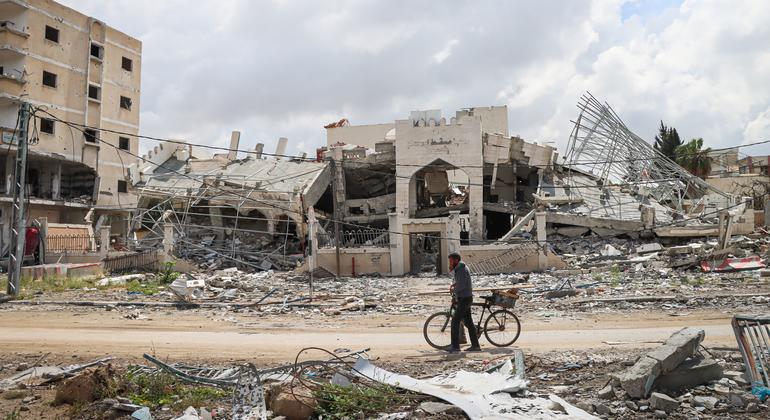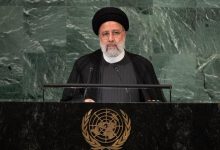Humanitarians hustle to prevent famine in Gaza
 Scaling up assistance in Gaza remains a challenge in the face of continued access denials, delays and other impediments, the head of the UN humanitarian affairs office (OCHA) in the occupied Palestinian territories said on Tuesday.
Scaling up assistance in Gaza remains a challenge in the face of continued access denials, delays and other impediments, the head of the UN humanitarian affairs office (OCHA) in the occupied Palestinian territories said on Tuesday.
Andrea de Domenico was speaking via videoconference to journalists in New York, briefing them on developments in the Gaza Strip and West Bank.
Tweet URL
He said although humanitarians welcome recent Israeli commitments to improve aid facilitation in Gaza, “we are dealing with this dance where we do one step forward, two steps backwards; or two steps forward and one step backward, which leaves us basically at the same point”.
Northern missions denied
Between 6-12 April, 41 per cent of humanitarian requests to the north were denied, he said. A UN convoy also came under crossfire while near a checkpoint during the same period.
Although humanitarians and the international community are making every possible effort to support people inside Gaza, “the reality is there is very little that we can bring…to tackle displacement and deal with the looming famine”.
Mr. de Domenico addressed the overall devastation in Gaza since the start of hostilities following the brutal Hamas attacks against Israel on 7 October 2023.
All universities destroyed
“The vast majority of schools have been destroyed and there is not a single university that is standing in Gaza. It will take years to bring back students to school, and you can imagine what is the implication for that,” he said.
The conflict has also seen “really very problematic” military operations at hospitals, such as the recent two-week offensive that left Al-Shifa Hospital “completely non-functional”. UN teams are now helping families with identifying the remnants of corpses found buried in graves within the premises.
He said “uncertainty is a daily reality for people in Gaza”, where families have been displaced multiple times. Thousands of Palestinians flocked to the coastal road two days ago following rumours that Israel would allow people to return to the north.
Meanwhile, engagement with Israel continues, including towards opening a border crossing into northern Gaza.
“We’ve seen some progress on that,” he said. “There are still some tests. It’s very sensitive, of course, as you can imagine, from the Israeli public, and also there are logistical challenges to face”, due to the sheer level of destruction in the north.
West Bank violence
Turning to the West Bank, he said a new wave of settler violence erupted last Friday following the discovery of the body of an Israeli boy who had gone missing.
Simultaneous attacks were carried out against 17 villages and three Palestinians were killed, and many more injured. The UN counted 21 homes completely burned, along with 30 cars and agricultural infrastructure, and 86 people displaced.
“There has been the use of live ammunition, and dozens of livestock have been killed and hundreds stolen. And Israeli forces in some cases, and accounts that we have collected on the ground, were somehow protecting the attackers or in some cases participating in the attack,” he said.
A ‘concerning’ situation
Mr. de Domenico said the development is “quite concerning…because it is entrenching a trend that has been very, very intense after October.”
He said 781 attacks have occurred since then, or more than four per day, and the newly appointed Palestinian Prime Minister has requested international support to prevent the situation from deteriorating.
The UN has also counted 114 new barriers that have been erected in the West Bank since 7 October, including checkpoints, roadblocks and road gates “which is constraining the ability of Palestinians to move to the point that some of our colleagues do not come to the office now for months”.
The restrictions have had an impact on livelihoods and also displaced more than 200 Palestinian households, some 1,300 people, mostly herder families.
Fresh appeal
On Wednesday, humanitarians will announce a $2.8 billion flash appeal to support some three million people across the West Bank and Gaza through the end of the year, with 90 per cent of the funding going to the enclave.
He said the original request was for $4 billion “but considering the limited ability to deliver and the space that we have to do so, we have really focused on the highest priority.”
Nora Chambers, an acclaimed journalist with a focus on global affairs and humanitarian issues, has dedicated over twenty years to reporting from conflict zones worldwide. Her work has spotlighted marginalized communities and highlighted urgent international concerns.




Why are access denials and delays still hindering aid delivery efforts in Gaza despite recent commitments to improve aid facilitation?
Well, Alexa, the situation in Gaza is extremely complex. Despite recent commitments, there are still challenges due to access denials, delays, and other impediments. It’s like we’re stuck in a frustrating dance, taking steps forward and backward, which makes progress difficult.
It’s disheartening to hear about the challenges faced by humanitarians in delivering aid to Gaza. The situation seems like a frustrating ‘dance’ of progress and setbacks. The international community must step up efforts to ensure access and prevent famine.
It’s heartbreaking to see the challenges faced by humanitarians in delivering aid to Gaza amidst access denials and delays. The situation highlights the urgent need for greater cooperation and support to prevent a looming famine.
As much as the efforts are appreciated, it’s disheartening to see the continuous obstacles hindering aid delivery in such critical times. It seems like a relentless struggle with minimal progress, leaving the vulnerable population in a dire situation.
Alice Johnson believes that it is crucial to address the challenges of access denials and delays in providing humanitarian assistance in Gaza. She emphasizes the importance of international efforts to prevent famine and support the people in the region. Alice is hopeful for progress but acknowledges the complex situation that often leaves aid initiatives at a standstill.
It’s disheartening to see the challenges faced in scaling up assistance in Gaza. The dance of progress and setbacks described by Mr. de Domenico reflects the difficult reality on the ground. It’s imperative that all parties involved prioritize the well-being of the people in Gaza to prevent a looming famine.
It’s heartbreaking to see the challenges faced by humanitarians in Gaza. Andrea de Domenico’s observations truly highlight the uphill battle in providing aid to those in need. The situation is dire, and urgent action is required to prevent a worsening humanitarian crisis in the region.
As a humanitarian aid worker myself, it’s disheartening to see the challenges faced in providing assistance to Gaza. The dance of progress and setbacks described by Mr. de Domenico truly encapsulates the struggle. We must find more effective ways to ensure aid reaches those in need despite the obstacles.
Despite the challenges faced by humanitarians in Gaza, it’s imperative that continuous efforts are made to provide aid and prevent famine. The recent commitments from Israel are a step in the right direction, but the dance of progress and setbacks needs to be overcome to truly make a difference in the lives of the people in Gaza.
It’s heartbreaking to see the continuous challenges faced by humanitarian efforts in Gaza. Despite the efforts to scale up assistance, the roadblocks created by access denials and delays are disheartening. Andrea de Domenico’s words truly reflect the frustrating dance of progress and setbacks experienced by those working tirelessly to prevent famine. The international community must step up its support to address the critical situation in Gaza.